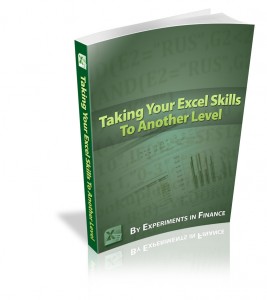My first forays into applying value investment principles to picking specific stocks were in November last year (2005), and over the next few days, I’ll be giving examples of three stocks I found and how they worked out: Nucor (NUE), Premium Standard Farms (PORK), and Audiovox (VOXX).
I found NUE first through Yahoo! Stock screener, as it was the only one that remotely approached hitting all of the stringent criteria needed for a defensive investment. After looking at the past 5 years of financial data, recalculating value investing ratios per Benjamin Graham’s methods (even though some claim they are outdated), and reading the 10K and 10Q filings for both companies, I decided NUE was a worthy prospect. How have I fared? Read on.
As mentioned, Nucor was the only company that I found that nearly met all of Graham’s financial ratio criteria. The only exception was his requirement that trailing 3-year average P/E * P/B <= 22.5. Around the time I bought, this was more around 26 based on my calculations. Still, I thought it was close enough. When I read Nucor's 10K, I didn't find anything in there that raised alarms; in fact, I liked that they were investing in new, potentially disruptive technologies (yes, a steel company was doing this); that management seemed very transparent and valued their employees; and that as a minimill, they applied lean manufacturing principles, in contrast to conglomerate US Steel (X). I did some peer comparison and read the 10Ks of STLD and CMC, both minimills, but unlike Nucor, these two companies were much smaller and carried the usual disclosure statements in their 10Ks warning about how changes in spot steel prices and reliance on only a few customers could potentially adversely affect their performance. In contrast, Nucor stated that (at that time) they had already successfully levied a surcharge to compensate for adverse steel prices to pass on additional costs to customers. I did the same ratio calculations for CMC and STLD that I had done for NUE, and both had red flags by a few other key ratios (such as Working Capital / Debt) that, together with what I had read in their 10Ks, led me to choose NUE instead. (Incidentally, if you've read this far, have I convinced you yet that 10Ks are worth reading before investing yet?) After doing my research, I bought NUE at $62 and later, again at $67. Then I sat back and watched the stock soar to past $82 in less than two months' time, a return of 27%. At that point, I wasn't sure what to do. Value investing emphasizes holding long-term, but logic said to sell since the stock appeared overvalued as at this price, the stock was well above the 22.5 cutoff point. Keeping in mind that you never know what the market will do, I decided to sell 3/4 of my shares at $84 and retain 1/4 of them for the "long run".
Now that the stock has run toward $117 (+74%), hindsight makes it easy to say I sold too early, but I can’t say it ranks up there as anything significant worth regretting since given the information I had at that point in time, I felt I made the best decision I could. I do wonder whether I should have bought some CMC, STLD, or X just to diversify, but again, I’m not unhappy that I played it conservative my first time at investing. I know many a person who gained and lost big during the dot-com bubble. I always try to keep in mind the asymmetry of gains and losses: a 33% increase need only to be offset by a 25% loss to wipe out all gains!
***************************************************
Look Good at Work and Become Indispensable Become an Excel Pro and Impress Your Boss

***************************************************


AllFinancialMatters » Blog Archive » What’s your method for figuring out when to sell a stock?
[…] Personally, I’ve tried selling based on fundamentals. When I bought NUE in the low 60s and it soared to 84 in only a few weeks’ time, I got antsy and sold most of my shares. Of course, NUE then proceeded go up another 30+ points before heading back down a bit. I realize you’ll always end up either selling too early or too late, but having a set methodology might make the selling process somewhat easier. […]
Stock Investing For Dummy
about investing in stocks…
To invest in the right stocks, you need to know how to read an annual…